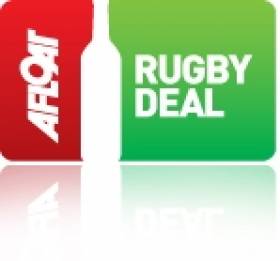Displaying items by tag: Rugby
Special Rugby Wine Deal for Afloat.ie Readers!
Big sailing (and rugby) supporters 'On the Grapevine' Wines in Dalkey Co. Dublin have been letting the early morning kick offs go to their heads. To celebrate Ireland's quarter final placing in the World Cup tomorrow, proprietor Gabriel Cooney has knocked 20% off all Red wine in his well stocked Dalkey shop if Ireland win. 20% of all White wine if the unthinkable happens. He's going one further for Afloat readers and adding a further 5% discount if you mention this post.
Here's hoping for a 'Red Wine' hangover!
Here's the deal from Gabriel himself:
"These early morning starts are really ruining my weekend lie-ins these days, but here we are in the quarter final of the World Cup, faced with an impressive-looking Wales team. I have always had a problematic relationship with Wales because, as a child in Wexford, I had to put up with the Welsh version of Channel 4 – S4C. So while the rest of you were enjoying edgy programming and interesting documentaries, we had to put up with Ivor the Engine re-runs. In Welsh.
Also, all that singing kind of annoys me.
Anyway, how you fashion a wine offer for a country that doesn't make wine? I put this to some of the best marketing minds in the country – Pam, Carol and my friend, Michael - and we have decided to forget geography and go by the colour of the jerseys – red and, er, green".
The offer is as follows:
If Ireland win : 20% off all RED Wine
If Wales win : 20% off all WHITE Wine
If Ireland win by more than 15 points (not going to happen, so I'm told) : 20% off ALL WINE
The offer is for ONE DAY ONLY, SATURDAY, OCT 8th. No other discounts apply, etc etc....
Something for everyone – see you on Saturday. COME ON IRELAND! And don't forget to mention Afloat for an extra 5%!
On the Grapevine, 21 St. Patrick's Road, Dalkey, Tel 00 353 1 2353054
Craftinsure Sponsor Royal St. George Junior Event
Dun Laoghaire's Royal St. George Yacht Club has announced that its inaugural Junior Spring Open, sponsored by Craftinsure, will be held on the 19th & 20th of March 2011. This event promises to be a great kick start to the Junior Sailing Season for the Optimist, 420, Feva and Laser Classes.
There will be both Regatta and Main Fleets, Regatta Coaches on the courses and the event will count as an Optimist Pre-Trials and Pre-Regional event. With the ISA Mitsubishi Youth National Championship being held in the same sailing area at the end of April, this event is a great opportunity for sailors from all around the country to get some practise in the local waters.
There will be entertainment for sailors and parents on both evenings, evening dinners and, of course, full Six Nations Rugby coverage on the Saturday throughout the Club. There will also be live-tweeting from the water throughout the event - follow this live action unfold at www.twitter.com/rsgyc.
For further information and to enter online please visit www.rsgyc.ie. The Entrance Fee is €85 for Fevas & 420s and €55 for Oppies & Lasers.
Fastnet Ferry Figures Smash 2010 Target
The passenger figure represents four-times the capacity of the Liberty Stadium, Swansea which is to host the rugby Heineken Cup clash between Swansea Neath Ospreys and Munster on Saturday 18 December.
The 10-hour ferry service operated by Fastnet Line also carried 31,000 vehicles and statistics suggest a significant boost for the Swansea Bay economy with about 40% of all passengers so far travelling from Cork to the south Wales region. The route is served by the MV Julia which had been sailing in the Baltic. The 1982 built vessel is capable of carrying more than 1,800 passengers and 400 cars.
Fastnet Line will run all-year-round in 2011 and has set a revised target of 120,000 passengers.
On a seasonal note, Christmas gift vouchers are available from Fastnet Line, for more information logon HERE
Ferry Special 'Munster Rugby' Sailings
After the match supporters can take the bus from Swansea city centre to the ferryport, with departures on the hour at 19.00, 20.00 and 21.00hrs. Passengers check-in times at the terminal are from 19.00hrs and up to 2200hrs. The return sailing departs at 2350hrs on Saturday 18 December and arrives into Cork at 1400hrs on Sunday 19 December.
For information on prices contact Fastnet Line Tel: (021) 4378892 or logon to www.fastnetline.com




























































